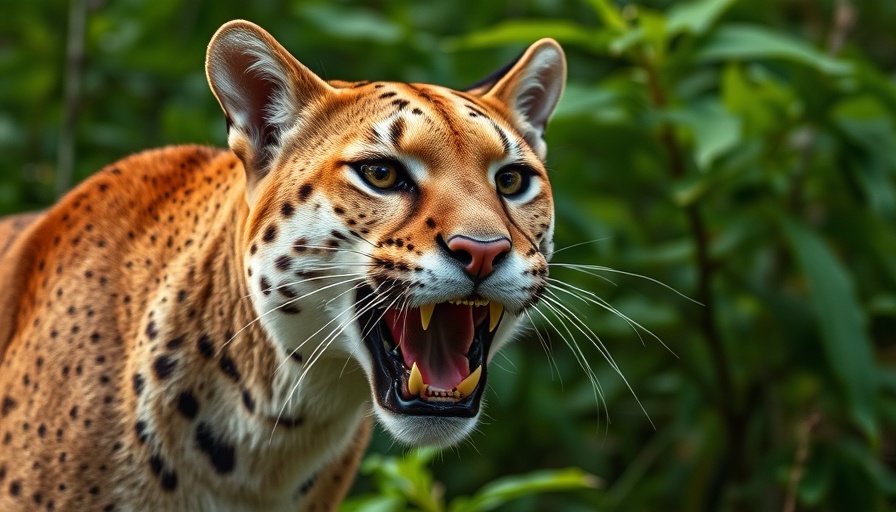
Florida's Miccosukee Tribe Takes Bold Steps for Wildlife Conservation
In a proactive move against the backdrop of decreasing federal conservation funding, the Miccosukee Tribe of Florida is embarking on an ambitious land acquisition project aimed at establishing a vital wildlife corridor. This initiative comes as a response to the dwindling support for conservation, particularly following slides in budget allocations during the Trump administration, which saw over $56 million cut from federal conservation funds affecting many federally recognized tribes.
Why This Wildlife Corridor Matters
Covering 18 million acres, the planned corridor will connect existing private and state lands that serve as habitats for various endangered species, including the Florida panther and the Key deer. The importance of such corridors cannot be overstated; they allow species to migrate, find food, and breed while fostering genetic diversity crucial for survival. As ecological experts have noted, fragmented habitats can lead to isolated populations and increased vulnerability to extinction.
Historical Context: A Legacy of Stewardship
The Miccosukee Tribe has long served as stewards of the Everglades, a region they have diligently managed for generations. Their commitment to conservation reflects a deep-seated cultural connection to the land. Talbert Cypress, chair of the Miccosukee Tribe, emphasized their historic ties during a press conference stating, "Our collective Indigenous Knowledge offers a unique perspective informed by this deep and historic relationship to the lands and waters of the National Wildlife Refuge System that lie within our traditional lands.” This emotional connection to their territory underlines that the fight for conservation is not just about wildlife; it’s about maintaining their identity and heritage.
The Scientific Community Weighs In
Studies from the Native American Fish and Wildlife Society (NAFWS) have painted a concerning picture of financial shortfalls, revealing that federally recognized tribes are struggling under the weight of federal cuts. With essential funding slashed, the tribes are increasingly forced to take matters into their own hands for the sake of biodiversity. The scientific community emphasizes that while legislation changes, ecological processes remain constant. Protecting these vital corridors is critical for sustaining biodiversity, underscoring the tribe's initiative as essential rather than optional.
Building Partnerships for a Sustainable Future
The Miccosukee Tribe has entered a partnership with the Florida Wildlife Corridor Foundation, highlighting a community-driven approach to wildlife management and conservation. This collaboration not only aims to protect flora and fauna in a holistic manner but also seeks to inspire boutique hospitality professionals in nearby ecosystems to engage in practices that harmonize with nature. By investing in eco-conscious tourism, hospitality managers can support conservation efforts by promoting biodiversity and responsible travel.
Future Predictions: The Impact of Community-Driven Conservation
The Miccosukee Tribe’s land purchase is not merely a transaction; it represents a movement towards greater autonomy in wildlife management, setting a precedent for other tribes and communities. It signals a shift where local knowledge and governance take precedence amid a backdrop of federal uncertainty.
As boutique hospitality professionals, the implications are significant. Embracing sustainable practices not only appeals to environmentally conscious travelers but also offers a pathway toward creating alliances for conservation. The emerging trend of eco-tourism can directly benefit communities, leading to revived ecosystems, protected species, and enriched cultural narratives.
Why Knowledge Is Power: Actionable Insights
For small-scale hotel owners and eco-lodge operators, understanding the importance of initiatives like the Miccosukee Tribe’s land purchase can inspire proactive engagement in sustainable tourism. This growing eco-awareness necessitates leveraging local partnerships and promoting conservation efforts. Simple strategies such as providing educational resources for guests about local wildlife or engaging in habitat restoration projects can further enhance the connection between luxury vacationing and the natural world.
The Miccosukee Tribe’s latest efforts, as well as their historical connection to the Everglades, serve as a powerful reminder of the role each of us plays in protecting the environment. By taking small, conscious steps toward sustainability, we can collectively contribute to the health of our planet and preserve its intricate ecosystems for future generations.
As industry professionals, it’s vital to recognize how significant actions—like the tribe’s land purchase—can serve as an inspiration for sustainable business practices. It’s time to engage with nature and embrace the responsibilities that come with stewardship of our shared planet.
 Add Row
Add Row  Add
Add 




Write A Comment